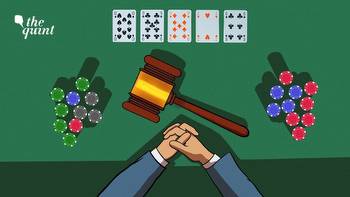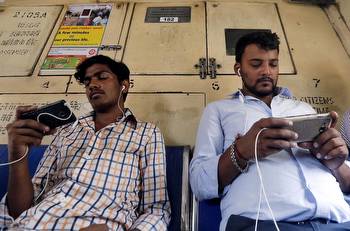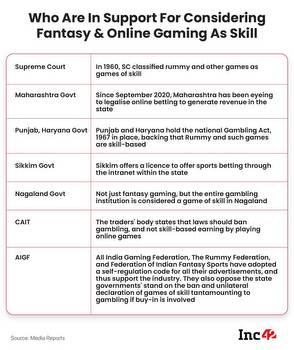Skill gaming startups caught in Karnataka's online gambling ban

For sectors like 'online gaming' and 'cryptocurrency', one word that best describes the present regulatory scenario is 'ambiguous'.
Both sectors are booming in India, but governments have their concerns related to user safety.
This dilemma played out again recently, with Karnataka notifying a law to ban and betting.
The law provides for up to three years of imprisonment, or a fine of up to Rs 1 lakh.
And here's the confusing part…
The Karnataka law states that 'games of chance' like online casinos and betting websites should be banned. But additionally, it has said that 'games of skill' where there is a risk of the player losing money should also be banned.
Now, several Indian courts have previously called games like poker, rummy, and fantasy sports 'games of skill' and deemed them legal. The Supreme Court, too, upheld Dream11's online fantasy sports format as a 'game of skill'.
The ban has come into effect and top gaming companies such as Mobile Premier League, have begun informing Karnataka users that the law in their state doesn't allow playing games for cash.
Nazara-owned fantasy sports app Halaplay, Paytm First Games and online rummy portals Ace2Three and RummyCulture have also stopped offering cash games to users in Karnataka.
didn't suspend its cash games along with everyone else, leading to an FIR against the company.
has claimed that the complaint is 'motivated', but it has also suspended its services in Karnataka now.
A source close to one of the gaming companies affected by the ban said the company was blocking access to Karnataka users through their IP addresses and KYC information.
The source added that the gaming company also had VPN blockers to ensure Karnataka users wouldn't bypass the ban.
There's an entire ecosystem thriving in Karnataka's capital Bengaluru, which is also India's startup hub.
According to media reports, the state is home to at least 91 Indian gaming companies and developers which employ about 4,000 people.
The industry supports an ancillary AVGC ecosystem. AVGC stands for animation, visual effects, gaming and comics.
in India is estimated to more than double in size to Rs 29,000 crore by 2024-25. The number of gamers will grow to 657 million during this period, according to a KPMG report.
The Federation of Indian Fantasy Sports (FIFS), led by Dream11, has said that the law seems 'misguided', since it penalises legitimate businesses by treating them at par with illegal online gambling, betting and wagering platforms.
We spoke to Ranjana Adhikari, Partner at law firm IndusLaw, to understand more about how the Karnataka legislation disregards all legal precedents for the online skills-based gaming industry. Highlights of what she told us:
- Karnataka law overlooks set legal principles
- Games of skill protected under Constitution
- Recent SC and Madras HC judgments upheld legality of online skill games
- Similar ban in Telangana made underground gambling market more lucrative
- Telangana officials looking at a more 'business-friendly and balanced law'
- Karnataka law unlikely to pass the test of legal principles
In addition to Karnataka… Tamil Nadu, Telangana, Kerala, Odisha and Assam have also banned online real-money gaming, disregarding the legal distinction between games of skill and games of chance.
State governments have been able to make their own laws in this regard since 'gambling' is a state subject in India.
However, these state bans stand on very thin legal grounds. Recently, the Kerala High Court struck down the ban on real-money by the state government.
It is important to note that all of the states that have banned online real-money gaming, have cited worries over gambling addiction among youth, sometimes even leading them to commit suicide.
And they're not wrong.
But gaming companies have asserted that banning legitimate businesses would only lead the youth to illegal underground gambling platforms.
Policy experts suggest that given the huge potential for this sunrise sector, it might be time the Centre stepped in and introduced legislation to protect India's online gaming companies.
The law could have a range of measures, including those on responsible gaming, player protection and anti-money laundering, like in countries such as the UK.
Given the huge revenue, tax and employment opportunities in the online gaming industry, a central law to regulate the space might be a prudent move.





































